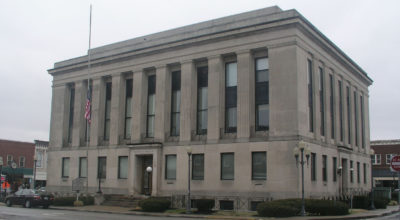
A group called Abolish Private Prisons has filed a complaint in U.S. district court in Arizona on behalf of five people in private prisons and the Arizona State Conference of the NAACP. It seeks class action status against state government and its prison boss, David Shinn.
By David Tulis / NoogaRadio 92.7 FM
This lawsuit on behalf of inmates Jeffrey Nielsen, Larry Hilgendorf, Terry Brownell, Joseph Bulen, and Brian Boudreaux challenges the practice of putting people behind bars not for the benefit of society but for the benefit of corporations, their executive board, and their shareholders.
Such a practice injects perverse financial systems into the criminal justice system and reduces the prisoners to numbers on a balance sheet, stripping them of dignity and turning them into modern slaves, Abolish Private Prisons says.
The NAACP favors ending private prisons in a resolution holding that “private prison industry profits from the incarceration and labor of citizens” and that private prisons “consider incarcerated citizens as cash-cow stock” and “exploit prison labor for pennies on the dollar.”
Its indicates federal data from 2013, there were 133,000 state and federal prisoners housed in privately-owned prisons in the United States of America and that these people are “vulnerable to loss of their freedom and livelihood for the sake of financial gains.”
Mr. Shinn oversees Arizona Department of Corrections, Rehabilitation & Reentry, or ADCRR for short.
AZ-Lawsuit-to-end-private-prisons: Download
The agency “incarcerates thousands of ADCRR prisoners in prisons owned and/or operated by private for-profit corporations,” according to the complaint, and “will continue to incarcerate thousands of people in private prisons into the foreseeable future” under contract. The agency “places approximately twenty percent (20%) or more of the prisoners committed to its custody, or approximately 8,000 people on any given day, in private prisons that are operated in Arizona by private prison corporations, including The Geo Group, CoreCivic and Management & Training Corporation.”
Officers in these facilities are believed to be badly trained and under pressure. “Arizona law and [state] rules do not require that private prison security officers meet the training and certification standards required of [state] corrections officers. As a result private prison security officers have less training and experience than [state] corrections officers, which affects safety and security within the private prisons. Furthermore, on information and belief, private prison guards lack civil service protection and grievance processes, which makes them more vulnerable to pressure to violate or ignore rules in order to increase corporate profits.”
Prisoners = marketable capital
The agency’s contracts to incarcerate prisoners are described as “assets of the prison corporations that the corporations use to entice investments and use as collateral to borrow and grow their businesses. In this sense, ADCRR enables private prison corporations to commodify human beings just as private jails in the nineteenth-century South commodified slaves.
“The value of those jails, and the economic reputation of the jails’ owners, was tied to how many slaves they incarcerated. For example, R.G. Dun and Company (the predecessor firm to Dun and Bradstreet) evaluated the credit worthiness of owners of slave jails and traders in slaves just as they evaluate private prison corporations today.
“The value of The Geo Group and CoreCivic stock is materially affected by the number of prisoners they incarcerate, by projections of how many prisoners will be incarcerated and detained in their facilities, and by projections on further opportunities for growth.
“The relationship between stock value (as well as profits and salaries) and the number of human beings who have been commodified as assets creates a substantial conflict of interest between the for-profit prisons on the one hand, and the constitutional obligations of ADCRR and constitutional rights of plaintiffs and the plaintiff class on the other.
“The highest priority of private prison corporation management is to maximize profit and market share. This is accomplished by obtaining more assets in the form of commodified human beings, holding them in prison as long as possible, taking actions which may reduce their opportunity of parole or early release, and reducing expenditures for such things as medical care, dental care, education and training, access to clergy, chaplains, and non-religious counselors, and recreation. It is also accomplished by reducing the cost of workers in the prison by providing as little training, education, and certification as possible for staff, hiring the least expensive staff available, and operating the prisons with the smallest number of employees possible, which in turn can create dangerous and unhealthy conditions for prisoners.
“Private prison corporations have higher revenues, profits, and executive compensation when they incarcerate higher numbers of prisoners each day.”
The lawsuit says bosses get more pay when they “enhance prison corporation profits and stock values.”
These incentives “create serious risks of erroneous deprivations of liberty for each prisoner in private prisons. The prison corporation’s operational control gives it an almost unlimited ability to manipulate, inter alia, freedom within the prison, release dates, access to clemency and parole, and likelihood of recidivism.”
Auction for prisoners
The complaint says a prisoner’s presence in a private prison “generates more revenue and profit to a private prison corporation the longer the prisoner remains in the private prison” and that state contracts with private prison corporations are “publicly procured through competitive bidding. In such circumstances the volume of prisoners’ physical presence, custody, and control in prison cells is awarded through public auction.”
The department’s contracts for private prisons are valuable assets of the for-profit prison corporations that increase the value of the corporations, increase the value of their publicly-traded stocks, are used as collateral for loans for operations and growth to incarcerate more prisoners and are “used to encourage investment in the prison corporations.”
“Private prison publicly-traded stock values are affected materially by projections of profitability, which in turn are affected by projections on the numbers of private prison cells (or beds) that will be used to incarcerate prisoners such as the plaintiffs. In such manner each prisoner and each projected future prisoner represent units of profit that impact prison corporation stock value.”


